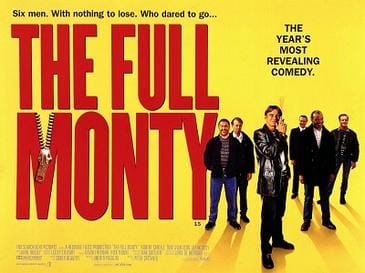full monty, the

If you became aware of the phrase the fully monty from the name of the 1997 film (e.g., you’re an American) you might think the phrase refers to being totally nude, but that is only a particular subsense of the phrase. More generally the full monty means everything, the works, the whole shebang. It’s a Briticism of unknown origin. Numerous suggestions have been offered as to its origin and what monty refers to, but there is no good evidence to support any of them.
The phrase is first recorded in a 22 September 1975 article in London’s Evening Standard newspaper about boxer Chris Finnegan and his number one fan, his wife Cheryl:
Cheryl (she has a laugh that explodes like a swamp bubble) is boxing’s leading female ringsider—and definitely the wrong woman to argue with as the tension mounts.
Sitting or standing Cheryl delivers a non-stop barrage of encouragement to Chris: “Give it the full monty,” she yells. “For Christ’s sake, Chrissie, get those bloody hammers going.”
The association with nudity is recorded two decades later, about the time the film is in production, which is about unemployed, male steelworkers who attempt to make some money by becoming strippers. But even though the first known use of the nudity subsense is in reference to the movie, the 1997 film probably takes its title from a British film-industry jargon sense of the full monty meaning to appear nude in a film.
The nudity subsense is first recorded in an article about the upcoming film that appeared in the New York Daily News on 1 January 1997:
Strapped for cash, and inspired by a visit from the Chippendales dancers to their town, six out-of-town [sic] steelworkers try to turn things around by forming an unlikely strip act. Carlyle plays a 30-year-old wild man, who convinces his friends (a well-endowed handyman, a suicidal security guard and an old geezer) to join him in the strip-for-cash scheme. Together they prepare a sexy revue that culminates in going “the full Monty”—baring it all in front of crowds of women and steelworkers.
But eleven days later, on 12 January 1997, the following appeared in an article about actor Steve Waddington in London’s Sunday Mirror that indicates the nudity sense was already in use among film industry insiders:
Those few seconds of nudity— which caused Emma [Thompson] to exclaim: “The man's got the body of a Greek god”—helped further Steve's reputation as Britain's most exciting young sex symbol. In Ivanhoe, a six-part series starting on BBC1 tonight, he is certain to win millions more adoring female fans.
Disappointingly, Steve doesn't get his kit off in Ivanhoe. “I’m bare-chested a couple of times, but not the full Monty,” he says. “For one thing, chain mail is such a long-winded thing to take off, it would need a whole episode to do it. And the love story is romantic rather than overly sexual.”
So the semantic progression seems to be that the general sense of the works developed in the early 1970s, and by the mid 1990s within the British film industry the full monty had developed a specialized sense of appearing nude in a movie. The producers of the 1997 film The Full Monty took the title from the film-industry jargon sense, and that was the sense of the term that was introduced to the North American public when the movie debuted in August 1997.
But none of the evidence sheds any light on the what the significance of monty is. But that hasn’t deterred idle speculation. Some claim that it is from the name of Field Marshal Bernard Law Montgomery either because of his penchant for supposedly eating a full English breakfast each morning or for his penchant for set piece battles in which infantry, armor, artillery, and air support are all in place and properly coordinated. No one has come up with any evidence linking the field marshal to the term, and it is unlikely that a term inspired by him would start appearing some thirty years after World War II. Others say it originally referred to a bespoke, three-piece suit from London tailor Montague Burton, but again no evidence has surfaced that links the man or the company he founded to the phrase. Others have suggested it comes from the American/Mexican card game of monte, which is played with a deck of forty-five cards, an origin that is improbable for a British phrase. And others claim it is a reference to “breaking the bank” at the Monte Carlo casino, a feat that has been achieved several times, but which is also unlikely to be the origin. Finally, there is a use of monte in Australian and New Zealand slang, dating to the late nineteenth century, meaning a racecourse tipster or a sure thing, a wager that is all but guaranteed to win. This term, perhaps a variation on the name of the con game of three-card monte or after a bookie of that name, could possibly be related to the later British term, although, again, it seems unlikely.
In short, the only thing we can say with any degree of confidence is “origin unknown.”
Sources:
Benza, A. J. and Michael Lewittes. “Hot Copy: Spotting Trains and More.” Daily News (New York), 1 January 1997, 20/1. ProQuest Historical Newspapers.
“The Blackman Interview: Cheryl Finnegan and Her Specialty—The Shadrach.” Evening Standard (London), 22 September 1975, 39/1. ProQuest Historical Newspapers.
Green’s Dictionary of Slang, n.d., s.v. monty, n., monte, n.1.
Oxford English Dictionary, third edition, June 2001, s.v. full monty, n. (& adj.); December 2002, s.v. monty, n.
Tréguer, Pascal. “A Lancashire Phrase: ‘The Full Monty.’” Wordhistories.net (blog), 27 August 2017.
Wills, Colin. “My Sex with Emma Thompson Only Lasted Seconds.” Sunday Mirror (London), 12 January 1997, 24. ProQuest Newspapers.
Image credit: Redwave Films / Channel Four Films / 20th Century Fox, 1997. Wikimedia Commons. Fair use of a low-resolution copy of a copyrighted image to illustrate the topic under discussion.